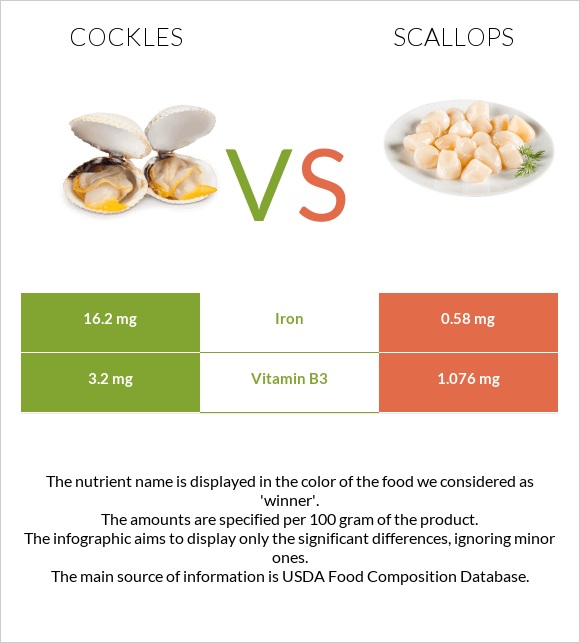Cockles vs. Scallops — In-Depth Nutrition Comparison
Compare
How are cockles and scallops different?
- Cockles are higher than scallops in iron, vitamin B2, and vitamin B3.
- Cockles cover your daily need for iron, 195% more than scallops.
- Cockles contain 8 times more vitamin B2 than scallops. Cockles contain 0.2mg of vitamin B2, while scallops contain 0.024mg.
Cockles, raw (Alaska Native) and Mollusks, scallop, (bay and sea), cooked, steamed types were used in this article.
Infographic

Infographic link
Mineral Comparison
Mineral comparison score is based on the number of minerals by which one or the other food is richer. The "coverage" charts below show how much of the daily needs can be covered by 300 grams of the food.
| Contains more CalciumCalcium | +200% |
| Contains more IronIron | +2693.1% |
| Contains less SodiumSodium | -100% |
Vitamin Comparison
Vitamin comparison score is based on the number of vitamins by which one or the other food is richer. The "coverage" charts below show how much of the daily needs can be covered by 300 grams of the food.
| Contains more Vitamin B2Vitamin B2 | +733.3% |
| Contains more Vitamin B3Vitamin B3 | +197.4% |
| Contains more Vitamin B1Vitamin B1 | +20% |
All nutrients comparison - raw data values
| Nutrient |  |
 |
DV% diff. |
| Iron | 16.2mg | 0.58mg | 195% |
| Vitamin B12 | 2.15µg | 90% | |
| Phosphorus | 426mg | 61% | |
| Selenium | 21.7µg | 39% | |
| Sodium | 667mg | 29% | |
| Choline | 110.7mg | 20% | |
| Protein | 13.5g | 20.54g | 14% |
| Cholesterol | 41mg | 14% | |
| Zinc | 1.55mg | 14% | |
| Vitamin B2 | 0.2mg | 0.024mg | 14% |
| Vitamin B3 | 3.2mg | 1.076mg | 13% |
| Magnesium | 37mg | 9% | |
| Potassium | 314mg | 9% | |
| Vitamin B6 | 0.112mg | 9% | |
| Vitamin B5 | 0.366mg | 7% | |
| Folate | 20µg | 5% | |
| Copper | 0.033mg | 4% | |
| Calories | 79kcal | 111kcal | 2% |
| Calcium | 30mg | 10mg | 2% |
| Starch | 3.69g | 2% | |
| Manganese | 0.029mg | 1% | |
| Saturated fat | 0.218g | 1% | |
| Polyunsaturated fat | 0.222g | 1% | |
| Fats | 0.7g | 0.84g | 0% |
| Net carbs | 4.7g | 5.41g | N/A |
| Carbs | 4.7g | 5.41g | 0% |
| Vitamin D | 2 IU | 0% | |
| Vitamin A | 2µg | 0% | |
| Vitamin B1 | 0.01mg | 0.012mg | 0% |
| Trans fat | 0.009g | N/A | |
| Monounsaturated fat | 0.082g | 0% | |
| Tryptophan | 0.173mg | 0% | |
| Threonine | 0.629mg | 0% | |
| Isoleucine | 0.692mg | 0% | |
| Leucine | 1.226mg | 0% | |
| Lysine | 1.258mg | 0% | |
| Methionine | 0.487mg | 0% | |
| Phenylalanine | 0.597mg | 0% | |
| Valine | 0.645mg | 0% | |
| Histidine | 0.314mg | 0% | |
| Omega-3 - EPA | 0.072g | N/A | |
| Omega-3 - DHA | 0.104g | N/A | |
| Omega-3 - DPA | 0.005g | N/A | |
| Omega-6 - Eicosadienoic acid | 0.002g | N/A |
Macronutrient Comparison
Macronutrient breakdown side-by-side comparison
| Contains more WaterWater | +12.2% |
| Contains more ProteinProtein | +52.1% |
| Contains more FatsFats | +20% |
| Contains more CarbsCarbs | +15.1% |
| Contains more OtherOther | +28.7% |





